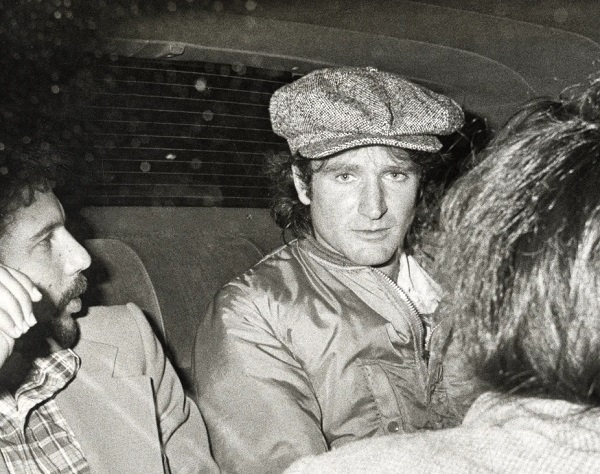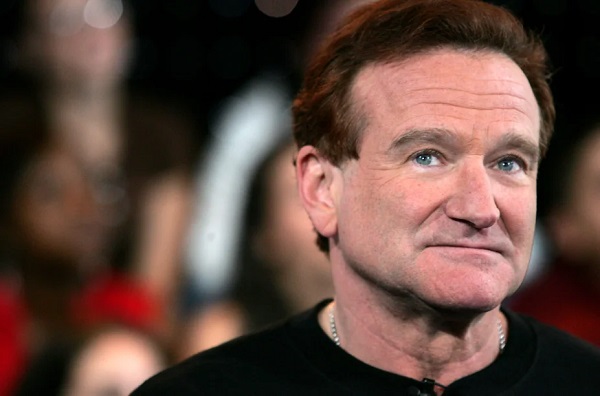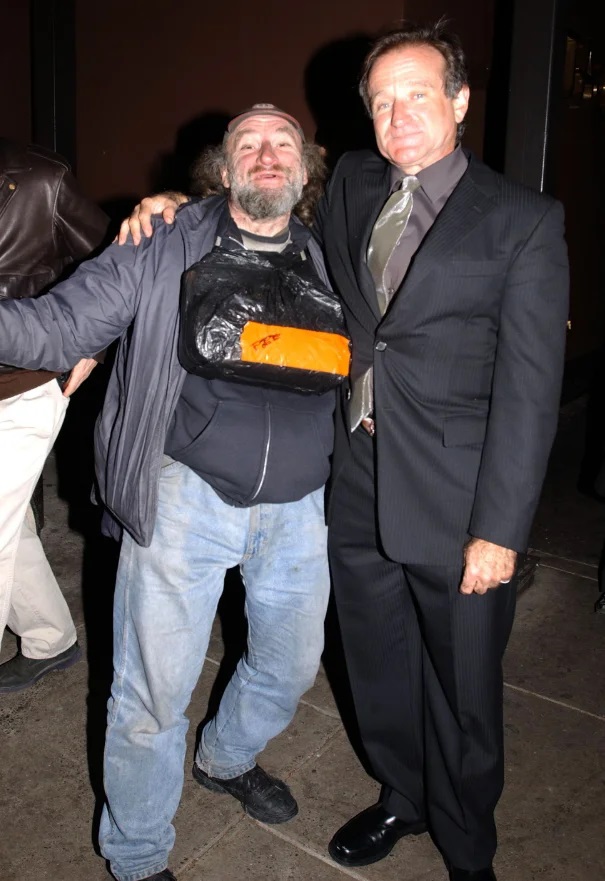Robin Williams’ Compassionate Contract: Empowering the Homeless for a Brighter Future
Despite enduring profound loneliness and bullying in his youth, Robin Williams blossomed into a compassionate and generous individual. As a highly successful actor and millionaire, he included a remarkable stipulation in his contracts, mandating production companies to employ homeless individuals. This gesture underscored his dedication to uplifting others and addressing societal issues.
Tragically, despite devoting his life to spreading joy, Williams grappled with acute depression and anxiety. His battles with mental health ultimately led to his premature demise.
Celebrated for his unparalleled improvisational talents and versatile performances, Robin Williams was hailed as one of history’s greatest comedians. Yet, alongside his comedic genius, he carried the burden of personal struggles, including a family history marked by alcoholism.
Raised in affluence by his father, a Ford executive, and his mother, a socialite, Williams encountered the specter of alcoholism early on, shaping his life’s narrative in profound ways.
Despite the illusion of opulence and comfort, Laurie Williams, Robin Williams’ mother, later confessed that she had been oblivious to her son’s profound loneliness during his childhood. Robin, who had an entire floor of his family’s mansion to himself, often engaged in solitary play with toy soldiers, giving each a unique voice. He was predominantly raised by Susie, their African-American maid.

Growing up amidst affluence in San Francisco, Robin Williams remained keenly aware of his surroundings, particularly the struggles facing his community. In his neighborhood, people yearned for relief programs to alter their fortunes. David Steinberg, Williams’ childhood friend and comedian, noticed a distinctive sense of solitude in him, which he attributed to Williams’ burgeoning comedic talent.
Despite his comedic nature, Robin Williams faced a difficult childhood and was frequently subjected to bullying at school, in part due to his physique. Although his mother later disputed assertions about his weight, Williams endured both physical and intellectual harassment. He spent three years in an all-boys institution, reminiscent of the one portrayed in his movie “Dead Poets Society.” Initially encountering difficulties, he gradually developed resilience, bolstering his self-assurance by joining the high school wrestling team.

Williams’ challenging upbringing, marked by his earnest quest for his mother’s attention and approval, enduring bullying, and profound isolation within his family home, is said to have laid the groundwork for the comedian and actor he would later become.
His exceptional knack for improvisation, perhaps initially a coping mechanism for loneliness during his formative years, found fertile ground upon his move to Los Angeles, where he swiftly garnered the support, camaraderie, and fame necessary to carve his path as a comedian.
In no time, Williams mesmerized audiences with his myriad characters, voices, and performances, showcasing a magic only truly grasped by those who had witnessed his genius firsthand. As his popularity surged in the late 1970s, the entertainment industry eagerly embraced his extraordinary talent.
Over time, Williams cultivated a thriving career as both an actor and comedian, amassing considerable wealth. By 2012, his net worth was estimated at $50 million. Yet, amidst his fame and fortune, he remained grounded in humility, kindness, and compassion.

In 2014, Perry Marshall, an author and marketer, recounted a story that he had shared with permission from Brian Lord, who had once sought to book Robin Williams for an event. According to Lord, the actor famous for his role in “Mrs. Doubtfire” had an extraordinary stipulation in his rider.
Williams insisted that the company hiring him must also offer employment opportunities to several homeless individuals during their contractual collaboration. Reflecting on Williams’ compassionate nature and altruistic gesture, Perry expressed admiration in his caption:
“I wonder how many production companies continued this practice into their subsequent projects after Robin Williams, and how many individuals had the opportunity to gain employment and experience the pride of earning an income, even if temporarily, due to his actions… Thank you, Robin Williams—not just for the laughter, but also for setting a remarkable example.”
Another account revealed Robin Williams’ proactive advocacy for homeless employment, urging production houses to each employ a minimum of ten individuals without homes. Throughout his career, he was estimated to have supported nearly 1,520 homeless individuals.
Collaborating with fellow actors such as Whoopi Goldberg and Billy Crystal, the acclaimed “Aladdin” star spearheaded collective endeavors to uplift the less fortunate. Together, they reportedly raised over $70 million for homeless individuals in the United States through the philanthropic initiative Comic Relief.
Robin Williams, recognized for his outstanding talent as an entertainer, also left a lasting legacy through his humanitarian efforts and selfless philanthropy, often shying away from public recognition. Pediatrician Carrie Chen, who completed her residency at the University of California, San Francisco, revealed that Williams made clandestine visits to San Francisco General Hospital every Christmas.
Chen recounted a poignant memory from Christmas Day in 1998 when Williams quietly entered the pediatric ward, bearing gifts for all the children. At that moment, Chen and her colleagues were attending to a premature baby born at 28 weeks. Upon inquiring about the medical staff’s whereabouts, Williams was informed of their dedication to the newborn.
Upon hearing that the infant was stable, Chen recalled Williams entering the room, visibly moved to tears at the sight of the thriving child. The actor, famous for his role in “The Fisher King,” expressed heartfelt gratitude to the doctors and nurses for their compassionate care on Christmas Day.

Later, Williams visited another ward, surprising each child with a brand-new Nintendo video game set — a generous and cherished gift at the time. Reflecting on the experience, Chen noted, “I believe he simply wanted to make a difference. He didn’t seek recognition or publicity. Nobody knew he was there; he slipped in quietly. He just wanted to bring joy to those children on Christmas.”
Renowned for his role in “Man of the Year,” Robin Williams’ compassion extended beyond humans to include animals. In 2001, he shared a life-altering moment with a gorilla named “Koko” in California. Koko, grieving the loss of her lifelong companion Michael, experienced her first smile since his passing upon meeting Williams. Their interaction, akin to that of a father and child, helped Koko emerge from her mourning, with Williams even weaving their heartwarming encounter into one of his performances. When Koko learned of Williams’ passing, she reportedly felt solemn and mournful, expressing her sorrow without tears.
Williams’ empathy also touched the lives of his friends and colleagues. Filmmaker Steven Spielberg revealed that a weekly 15-minute phone conversation with Williams during the 25th-anniversary celebration of “Schindler’s List” provided him with much-needed relief from stress and kept him motivated.

Having formed a deep bond during their time as roommates at The Julliard School in the ’70s, Williams shared a longstanding friendship with “Superman” actor Christopher Reeve. Following Reeve’s tragic accident in 1995 that left him quadriplegic, Williams visited him before a critical surgery, bringing laughter and hope to his friend. After Reeve’s passing in 2004, Williams joined the board of the Reeve Foundation, dedicated to spinal cord injury research. This commitment showcased Williams’ sincere concern for the well-being of others and served as a touching tribute to his cherished friend’s memory.
Despite Robin Williams’ relentless dedication to helping others, he grappled with his own inner turmoil and depression. During the filming of his final on-screen performance in the 2014 movie “Night at the Museum: Secret of the Tomb,” a member of the makeup crew, Cheri Minns, observed his daily emotional breakdowns. Encouraging him to return to stand-up comedy, Williams tearfully confessed that he had lost his comedic spark. Subsequently, it was disclosed that he had been diagnosed with Parkinson’s disease, an incurable and progressive nervous system disorder.
Peter Asher, a close friend of Williams, revealed that the actor had visited him a few months prior to his passing, expressing profound unhappiness. Despite the concerns expressed by those close to him and worries about his well-being, Williams continued to grapple with his mental health challenges. On August 11, 2014, at the age of 63, the beloved “Hook” actor was discovered deceased in his Tiburon residence by his assistant late in the morning, marking the end of a life that had brought laughter and solace to countless individuals.


